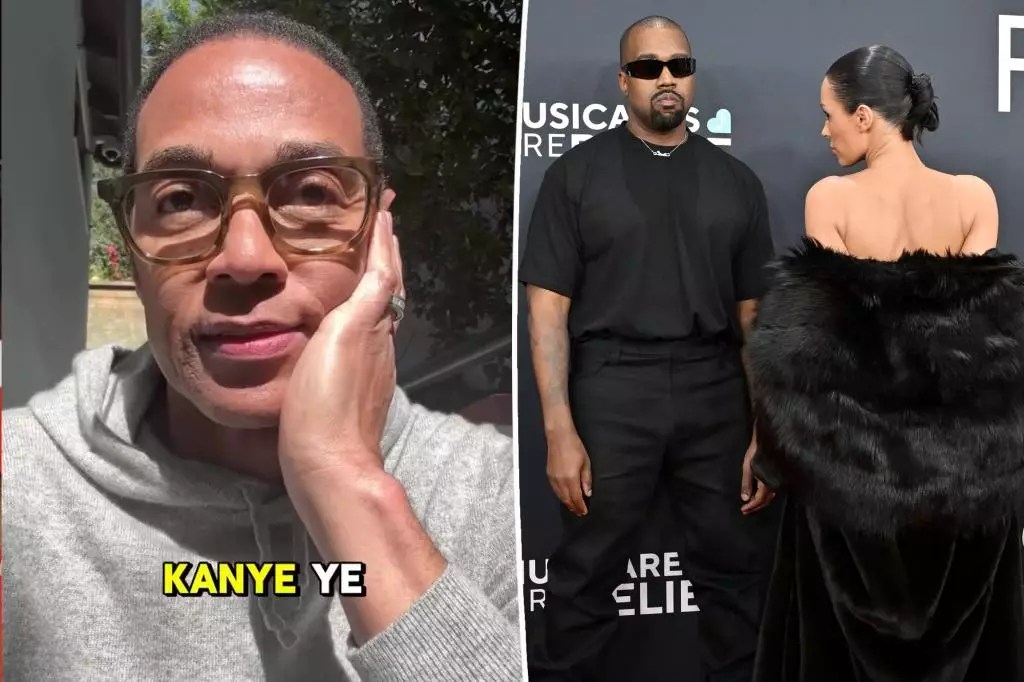In a world driven by social media and celebrity culture, conflicts can ignite and spread like wildfire. Recently, the heated exchange between CNN’s Don Lemon and rapper Kanye West became a trending topic after West labeled Lemon a “coon” during an Instagram confrontation. The rift emerged after Lemon shared a rumor about West and Bianca Censori reportedly being removed from the Grammy Awards, but the way the incident unfolded called for examination beyond mere name-calling.
Lemon rectified the initial rumor by clarifying he did not witness the incident firsthand but was only relaying information he heard. This small yet crucial detail underscores the importance of responsible journalism, especially in an era where misinformation can rapidly proliferate. The media’s integrity often faces scrutiny, and Lemon’s defense suggests a staunch commitment to accuracy, albeit within a potentially fraught situation. West’s reaction raises questions not only about personal animosity but also about how public figures wield their influence in an age where words can significantly impact reputations.
Lemon’s plea for respect carries weight, particularly when considering the historical implications of terms like “coon” and their resonances within the Black community. For many, such language is not only about personal insult; it embodies a deeper critique of identity, struggles, and societal dynamics. West’s use of the term suggests a brutal dismissal of Lemon’s credibility and integrity, yet it also reflects a schism prevalent among some within the Black community, particularly concerning the media’s portrayal of their narratives.
This incident spotlights the responsibilities that come with celebrity status. West, who has historically faced criticism for his volatile behavior and controversial statements, may seem to deflect rather than face critique when he uses derogatory language against fellow African Americans. This raises numerous questions about accountability and highlights the ongoing tension between how public figures navigate their roles in society versus the expectations placed upon them.
The public’s fascination with Kanye West extends beyond his music; it’s his ability to generate headlines and spark discussion. Lemon’s comments regarding Kanye’s promotional tactics illuminate the dual nature of West’s fame: Not only is he an influential artist, but he also embodies the intricacies of celebrity marketing. His red-carpet antics and bold fashion choices often serve as a narrative device, pushing boundaries and challenging norms within the entertainment industry.
Lemon’s acknowledgment of West’s “master marketer” status demonstrates an awareness of the calculated nature of celebrity antics, suggesting that West leverages chaos and controversy to maintain relevance in a crowded media landscape. While Lemon seems surprised by the nudity displayed at the Grammys, it aligns perfectly with the publicity strategies that define many of West’s endeavors, eliciting a mixture of shock, curiosity, and criticism that keeps him at the forefront of public discussions.
As this controversy unfolds, it’s imperative to reflect on the power dynamics at play. Lemon’s rebuttal of West’s harsher remarks, coupled with his appeal for respectful dialogue, underscores the complex interplay between public figures in a shared cultural landscape. The media holds a mirror to society, revealing uncomfortable truths while also bearing the weight of influence; they must navigate these responsibilities judiciously.
Moreover, the scandal highlights the need for accountability not only among celebrities but also within the media industry itself. Lemon’s insistence on clarifying misconceptions illustrates a commitment to ethical reporting, yet it simultaneously showcases the casual manner in which reputations can be tarnished in a matter of moments. This intersection of media, culture, and celebrity requires nuanced understanding and responsible engagement from both entertainers and the platforms they utilize.
The exchange between Don Lemon and Kanye West poses significant questions about respect and accountability in a landscape rife with fast-paced information dissemination. The layers within their conflict—rooted in cultural history, media ethics, and personal accountability—invite broader discussions on how individuals can navigate their narratives in an increasingly complex society. It is vital for all public figures to engage in constructive dialogues, underscoring the importance of respect despite differences, while also prioritizing responsible communication that enriches rather than diminishes their communities.







Leave a Reply